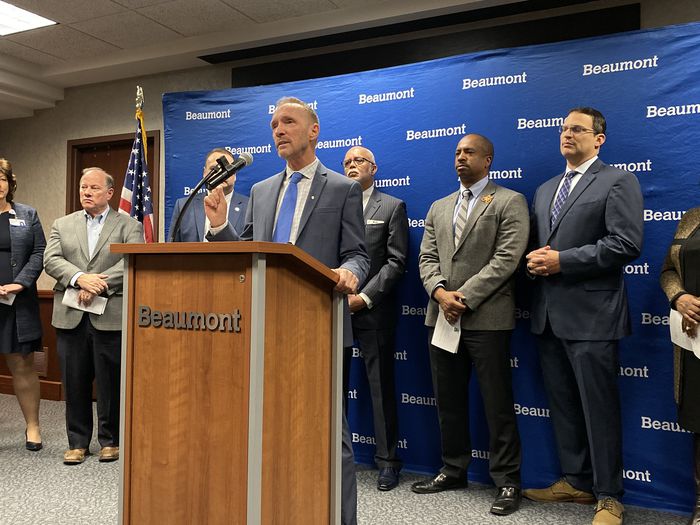
Last month, leaders from Oakland, Washtenaw, and Wayne Counties came together to affirm their commitment to improving and expanding transit throughout their communities. They committed to work together to get a coordinated regional transit funding measure on the November 2020 ballot.
Despite a great deal of excitement around this news, many questions quickly arose. Here’s our attempt at some answers, based on the November RTA meeting and personal discussions with county leaders.
(Or don’t take our word for it – download the statement the counties shared and the press statement from Wayne County.)
Is RTA being cut out?
NO. While RTA will not be the means by which regional transit funding is placed on the ballot, due to Macomb’s insistence on vetoing that, RTA will remain an essential partner in moving regional transit forward. They are likely to be a co-signer on an Intergovernmental Agreement with the Counties and Detroit and will likely play a critical role in transit planning and financing.
Will Macomb County no longer have bus service?
NO. Macomb County will continue to contract with SMART to provide vital transit service throughout Macomb County at least through 2022 and probably for decades more to come. Macomb County Executive Mark Hackel believes that SMART currently provides all the transit his county needs and has no desire to invest in any more advanced transit or any better regional connections.
Since the other three counties’ leaders believe the region needs more and better transit than we have today, those three counties can place funding measures on their three county ballots and, if successful, can greatly expand the transit service their counties provide. They will still connect with Macomb through SMART but Macomb will not see any new or expanded transit service.
Will DDOT and SMART be eliminated?
NO. New funding for new transit service would be added to existing transit funding for existing transit service. DDOT and SMART will continue to run the bus routes they run now. If this funding passes, DDOT and SMART are likely to have more money to run more service; some routes could run more frequently, other routes could be extended into new areas.
Many metro regions have multiple transit providers all seamlessly coordinated under one RTA. That’s the goal here.
So what’s the new regional transit plan?
There is no new transit plan, not yet. This announcement was a commitment to work together to develop an updated plan and seek the funding to implement it. It is likely any new transit plan will have a lot in common with the regional transit plan approved by RTA in 2016 (but not funded by voters) and with the regional transit plan advanced by Warren Evans in 2018. Both addressed many of the most essential regional needs – like connecting more places more frequently and more easily – and both were supported by numerous regional leaders. But it will not include an expanded transit service for Macomb County.
So what are the steps from here?
- First, they’re working to get a bill passed through the Michigan legislature that would amend the Municipal Partnership Act of 2011 to make it easier for the counties to work together on this.
- Meanwhile, the leaders of Oakland, Washtenaw, and Wayne Counties are working together, along with the City of Detroit and the RTA, on the legal agreement of how this partnership would work.
- Oakland County’s new Executive Dave Coulter plans to take the next few months to work with his residents and municipal leaders to better understand the diversity of needs and priorities in his county.
- Then they’ll all agree on some sort of regional transit priorities for how they want new funds invested.
- In the spring, each County Commission will need to vote to place a regional transit ballot measure on their county ballot in November of 2020.
- In addition to those official steps, TRU will be bringing supporters together to start educating voters about the need for regional transit investment and hearing their questions and concerns. A successful vote requires a huge amount of voter education and engagement. (Wanna help? Let us know at [email protected]!)
